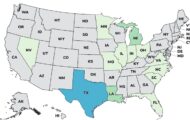In an effort to slow the spread of highly contagious viruses that have killed million pigs since last year, the U.S. Department of Agriculture (USDA) is now requiring pork producers to report cases of Porcine Epidemic Diarrhea Virus (PEDv) and Swine Delta Coronavirus. PEDv was discovered in U.S. herds in 2013 and his killed more than 4 million pigs in 27 states since that time. PEDv does not affect humans and is not a food safety concern. "USDA has been working closely with the pork industry and our state and federal partners to solve this problem. Together, we have established testing protocols, sequenced the virus and are investigating how the virus is transmitted," said USDA Secretary Tom Vilsack. The USDA is also requiring that movements of pigs, vehicles, and other equipment leaving … [Read more...]
More Porcine Epidemic Diarrhea Virus Cases Reported
The USDA has reported another 296 cases of porcine epidemic diarrhea virus (PEDv) last week. That brings the number of cases in the last 10 months to 4,757. The disease was first reported in the U.S. hog population in May 2013, with animals in 27 states infected. Unfortunately, each case report can mean just one animal has been sickened, or an entire herd at one farm is sick. The virus, which is deadly for baby pigs, doesn't affect adult hogs. The disease has killed more than 4 million piglets in this country since May 2013. This is most likely going to cause dramatic price increases at the consumer level in the next year, since hog prices are at record highs.The USDA's estimate of hog slaughter on March 21, 2014 was 360,000, down 51,000 head from a week ago. Scientists say that the … [Read more...]
Porcine Epidemic Diarrhea Virus Spreads to AZ
Arizona has become the 27th state to report confirmed cases of Porcine Epidemic Diarrhea Virus (PEDv) in pig herds. The highly contagious disease has killed more than 4 million U.S. pigs since 2013. Porcine Epidemic Diarrhea virus, a highly contagious and deadly pig disease has affected more than half of all states.[/caption] PEDv, which does not affect humans and is not a food safety risk, kills pigs through dehydration. More than 80 percent of piglets that contract the virus die. The National Pork Board says new funds have been earmarked for research to halt the spread of the disease. Those funds include $650,000 from the Pork Checkoff, a fund created by producers who contribute $0.40 contribution for every $100 of pork sold; and $500,000 through an new agreement with Genome … [Read more...]
Piglets Fed to their Mothers at Iron Maiden Hog Farm in KY
The Humane Society has released a disturbing undercover report about conditions at the Iron Maiden Hog Farm in Owensboro, Kentucky. The investigation, which was conducted in early 2014, found that more than 900 piglets died from a diarrheal disease in a two-day period. The piglet's intestines were ground up and fed back to their mothers and other sows, which is a practice prohibited by state law. The Humane Society statement said, "this practice appears to be fairly widespread within the industrial sector of the pig industry." In addition, Iron Maiden Hog Farm's practices are harsh and inhumane. HSUS is asking the Kentucky Livestock Care Standards Commission to end gestation crate confinement of pigs and to examine the practice of feeding diseased piglets to surviving pigs. The … [Read more...]
Is Cause of Porcine Virus Pig Feed With Pigs In It?
Is the virus killing millions of piglets in the U.S. and Canada caused by feed that contains pig products? The Canadian Food Inspection Agency (CFIA) think it might be, according to a story in the Toronto Globe and Mail. Porcine epidemic diarrhea virus (PEDV) is a highly contagious virus that causes serious, often fatal illness in suckling piglets through severe diarrhea and dehydration. It was discovered in the United Kingdom in 1971. Since its first appearance in the U.S. last spring, it has killed more than a million piglets and has recently entered Canada. PEDV is typically transmitted via the fecal-oral route meaning it is excreted in the feces of an infected animal and transmitted to other animals that ingest microscopic amounts of the infected feces. Tests on samples of feed … [Read more...]






